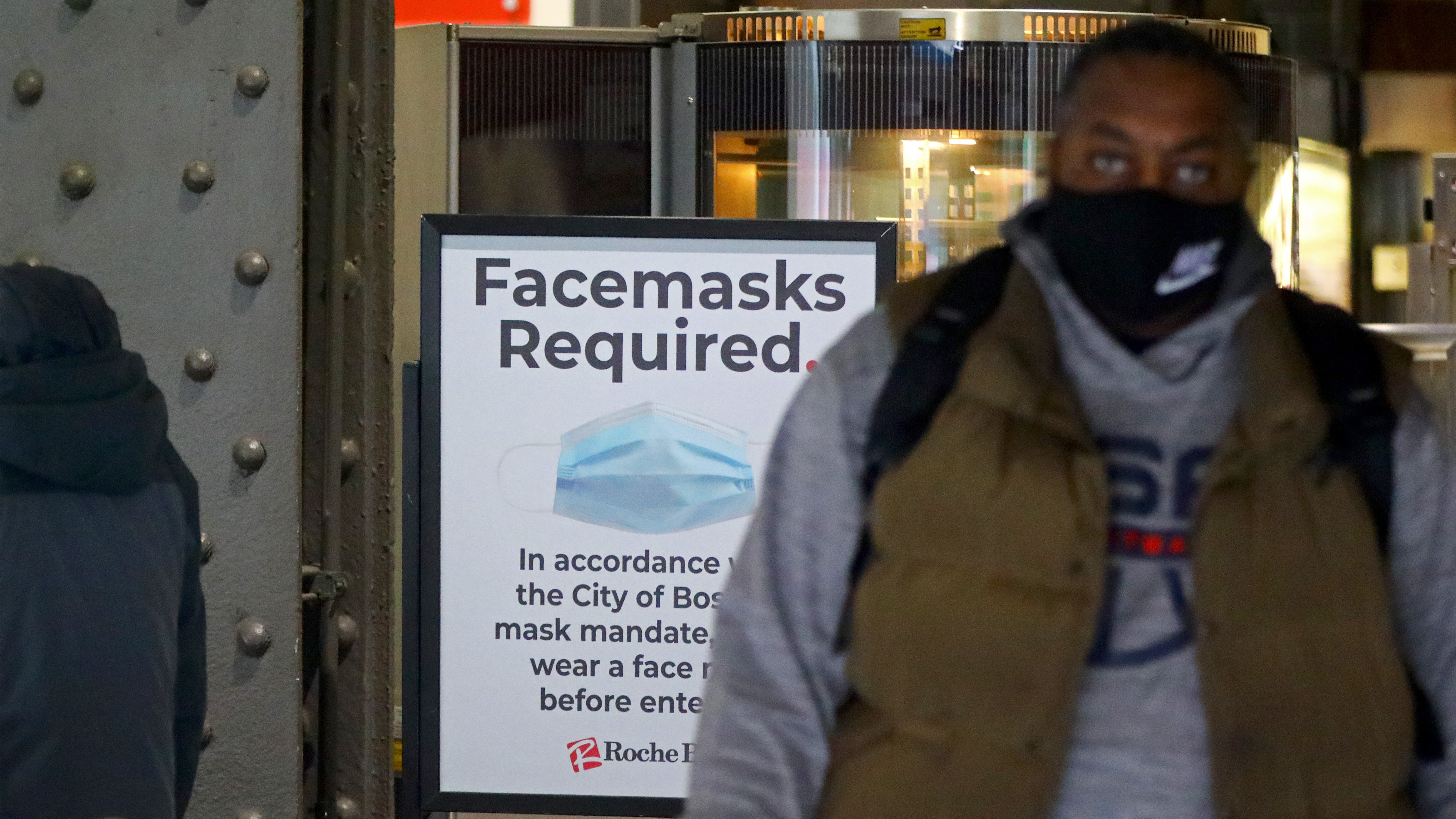
Massachusetts health officials relaxed the state's mask guidance Tuesday to advise that only high-risk individuals and the unvaccinated should wear face masks indoors.
Health officials are no longer advising vaccinated people without pre-existing conditions or weakened immune systems to wear masks indoors, which was the guidance they issued in December.
The Department of Public Health is still urging people to get vaccinated and boosted, noting that vaccination remains the most effective protection against serious illness, hospitalization, and death. DPH cited the state's vaccination rates and COVID-19 metrics in their decision to relax the guidelines.
Under the new guidance, anyone with a weakened immune system, at increased risk for severe disease because of age or an underlying medical condition, or who lives with someone with weakened immune system, is at increased risk for severe disease or is unvaccinated should wear a mask or face covering when indoors, though not inside one's own home.
There are multiple conditions that may put someone at higher risk for severe disease; information on those conditions can be found on the Centers for Disease Control and Preventions website.
DPH is also advising unvaccinated individuals to continue to wear a face covering or mask to help prevent spreading COVID-19 to other people.
Individuals who are considered close contacts or who have tested positive must follow the isolation and quarantine guidance, which includes wearing a mask in public for 5 more days after they leave isolation or quarantine on day 5, regardless of vaccination status.
All people in Massachusetts, regardless of vaccination status, are required to continue wearing face coverings in certain settings, including some transportation and health care facilities. As of Feb. 25, however, the CDC is no longer requiring that masks be worn on school buses or vans for K-12 students and children in childcare programs.
The Departments of Elementary and Secondary Education and Early Education and Care have since updated their guidance.
Massachusetts lifted its school mask mandate on Monday, but some school districts, including Boston, have opted to keep them in place until they hit certain key COVID-19 benchmarks.
A complete list of venues where face coverings have remained mandatory since May 29, 2021 can be found on the state website. They include:
- On public and private transportation, including on the MBTA, commuter rail, buses, ferries, and airplanes, and while in rideshares (Uber and Lyft), taxis, and livery vehicles, as required by the CDC Jan. 29, 2021 Order. Face coverings are also required at all times inside transportation hubs, including train stations, bus stops, and airports. Individuals waiting outside at transportation hubs no longer need to wear a mask. The requirement applies to riders and workers.
- Healthcare facilities licensed or operated by the Commonwealth and healthcare practice locations of any provider licensed by a professional board which sits within the Department of Public Health or the Division of Professional Licensure. These settings include nursing homes, rest homes, emergency medical services, hospitals, physician and other medical and dental offices, urgent care settings, community health centers, vaccination sites, behavioral health clinics, and Bureau of Substance and Addiction Services facilities. This requirement applies to patients, residents, staff, vendors and visitors.
- Congregate care facilities or programs operated, licensed, certified, regulated, authorized, or funded by the Commonwealth. These settings include the common areas of assisted living residences, group homes, residential treatment programs, and facilities operated, licensed, certified, regulated, authorized, or funded by the Department of Children and Families, the Department of Youth Services, the Department of Mental Health, the Department of Public Health, the Department of Developmental Services, the Department of Veterans’ Services, the Massachusetts Commission for the Blind, the Executive Office of Elder Affairs and the Massachusetts Rehabilitation Commission. This requirement applies to clients, residents, staff, vendors and visitors.
- Emergency shelter programs, including individual and family homeless shelters, domestic violence and sexual assault shelters, veterans’ shelters, and shelters funded by the Department of Housing and Community Development. This requirement applies to guests, staff, vendors and visitors.
- Houses of correction, Department of Correction prisons, jails, and other correctional facilities. This requirement applies to people who are detained or incarcerated, staff, vendors and visitors.
- Health care and day services and programs operated, licensed, certified, regulated, or funded by the Commonwealth, including the Executive Office of Health and Human Services or one of its agencies. These settings include adult day health, day habilitation, Program of All-Inclusive Care for the Elderly, psychosocial rehabilitation club houses, brain injury centers and clubhouses, day treatment, partial hospitalization and intensive outpatient programs, recovery support centers and center-based day support programs. This requirement applies to staff, visitors, vendors and consumers.
- Home health care workers, including Personal Care Attendants and Home Health Aides in community and home-based settings where they are providing patient-facing care; provided, however, the requirement shall only apply to the worker providing care.



